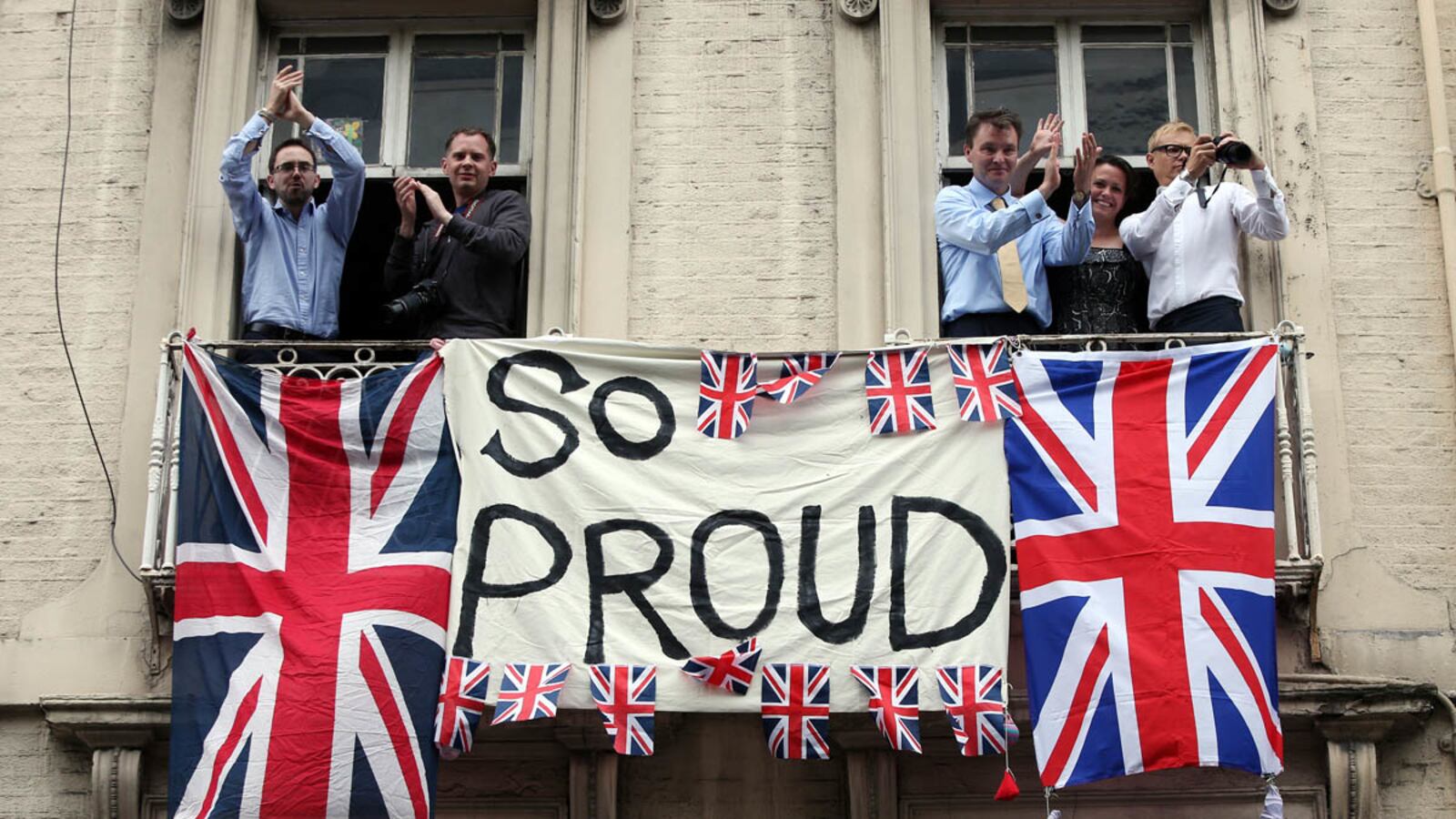It was in the bright dawn of the Tony Blair years, after Labour’s landslide victory in the 1997 general election, that the phrase “Cool Britannia” was coined to express the nation’s sudden glow of self-confidence and chic, a spirit that had got lost somewhere in the messy end of the Beatles era. This, it seemed, was not just a nation reclining pathetically on past imperial glories but one with things to do in the world, new things to achieve.
Something of the same mood gripped the U.K. this week at the end of a “golden summer” of Olympic sport that exceeded everyone’s expectations in every direction: that went off without a hitch or a terror scare and saw Britain rise to the giddy heights of No. 3 in the Olympic-league table, behind only the U.S. and China. In the middle of the longest and deepest recession anyone can remember, it put a quite unexpected bounce in the nation’s stride.
Things looked so very different back in May. Three months ago, what was on display was the well-developed British talent for carping, sneering, and nitpicking. The Olympic Park’s architecture was rubbish, people complained, the cost of staging the games was exorbitant, the whole notion of a country in steep decline staging such an event was Blairite vanity and folly (Mr. Blair was still prime minister in 2005, when London snatched the Olympics from under Paris’s nose). Symptomatic of what was shaping up to be a world-class shambles was the dismal failure of a company called G4S to produce even a fraction of the number of security guards it had promised: the government was obliged to call in the Army to do the job. The month of May was the wettest since records were first kept more than a century ago: all month the rain just never stopped. People speculated grimly on the Olympics being a washout.
But the weather gods took pity, the Army grunts showed their appreciation for being in East London rather than southern Afghanistan by doing a brilliant job, and the Olympics kicked off with an opening ceremony, directed by Danny Boyle of Slumdog Millionaire fame, that had something for everyone: from lovers of the National Heath Service to fans of William Blake and royalists eager for the world to notice that Queen Elizabeth has been on the throne for 60 years. The deadpan monarch entered into the ceremony’s spirit of surrealistic self-mockery, performing in her first-ever acting role (as herself) alongside Daniel Craig as James Bond.
The Games that followed were a vast success for the same reason as the opening party: because there was something in them for everybody: sports lovers, couch potatoes, patriots. Socialists hailed a triumph for events that had been heavily underwritten by the state; capitalists from McDonald’s and Coca-Cola had a ball; Prime Minister David Cameron enjoyed a respite from political storms; Boris Johnson, London’s eccentrically charismatic mayor, experienced a dramatic boost to his hopes of eventually replacing Cameron in the top job.

Britain’s newspapers, reeling from the phone-hacking scandal and a prolonged attack on their ethics, found they could sell millions of copies with obscure, fully clothed, and often quite plain young people on the cover, as long as they were clutching a medal. The nation looked diffidently into the vast mirror of the Olympics and—to collective surprise—found it liked what it saw. And this was not mere narcissism: in research carried out by the global PR group Ecco, canvassing 100 communications experts from 24 countries, 97 percent believed that the Games had resulted in a more positive perception of British products and services in their countries, and 99 percent expected that more people would visit Britain as a result of the Games.
The Cool Britannia mood of 1997 had looked forward in eager and largely misplaced optimism to the New Labour future. In its current mood of euphoria, by contrast, the U.K. looks back at its recent past and declares it good. The Games were a moment of national consolidation, of satisfaction with what the nation has become. The winning athletes ranged from royalty—Zara Phillips, grand-daughter of the queen, who took silver in equestrianism—to a Muslim immigrant from Somalia, Mohammed “Mo” Farah, who won the 10,000 meters for Britain. Multiculturalism has long been a fact of British life, but with so many athletes of color winning medals for Britain, at last it was something for the whole country to cheer.
And something comparable happened during the Paralympics, the success of which confounded expectations: more than 11 million people watched the opening ceremonies, the stadiums were packed, and media coverage of the disabled athletes’ achievements was wall-to-wall. Typical of the unlikely heroes of these second Games was Martine Wright, both of whose legs were blown off in a suicide bomb attack on the London Underground on July 7, 2005, the day after the Olympic Games were won for the city. Since then she has gotten married, had a child, gained a pilot’s license, made a parachute jump, and taken up sitting volleyball, for which she was picked for the British team. Whatever the other legacies of this brilliant summer, a radically changed perception of people with disabilities will be one of the most welcome.






